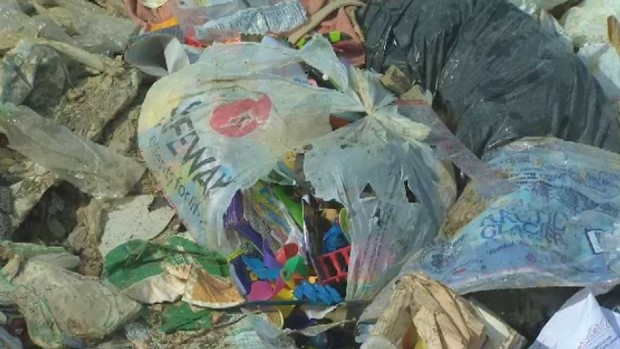Clover Bar landfill capping would be a 'significant reduction' in Edmonton's emissions
 (File)
(File)
Thirteen years after closing to the public, Edmonton's Clover Bar landfill continues to release methane fumes, with plans to implement capture technology converting them into renewable biogas moving ahead.
First opened in 1975, the Clover Bar landfill was the city's first engineered sanitary landfill featuring groundwater diversion and leachate treatment.
It was able to operate for 20 years longer than planned after recycling programs were brought online, finally closing in August 2009 after reaching full capacity.
According to the city's proposed waste services capital funding request for this budget cycle, safety and environmental enhancements to the landfill site need to be constructed, including erosion controls and a cutoff wall to prevent leaks into the North Saskatchewan River.
City council's utility committee met privately Friday to discuss the landfill-gas-to-renewable-gas conversion project. That was approved, also privately, in February 2021.
A landfill gas collection system has been in place since 1992, the capital profile report for the project notes. It is currently owned and operated by Capital Power under a contract that ends in 2024.
The city will take back control of the gas conversion site, but a condition assessment shows it needs upgrades to meet minimum environmental regulations.
The proposed utility budget calls for $16.7 million to upgrade the landfill gas collection and flare system. Capital Power will fund $4 million of that project and the city will leverage a provincial grant for $10 million.
The city will contribute $2.7 million, with the remaining $14 million will be "funded externally."
Once operational in 2024, the city anticipates it will produce approximately 325,500 gigajoules of renewable natural gas annually.
According to city administration, council heard about the project in private since disclosure of discussions could harm "economic and other interests of a public body."
While specifics of what was discussed at that meeting are not known, some form of the project update required council approval.
When asked by Mayor Amarjeet Sohi during open utility committee proceedings what actions the city could take any action to "expedite" progress on addressing the city's climate change and resiliency goals, Denis Jubinville, waste services manager, pointed to capping the landfill.
"Likely the largest impact we can have on our region is capping the Clover Bar Landfill," Jubinville told the committee.
"We know there's very harmful landfill gas that's able to escape through the top of it," he added. We need to cap it. We need to put three feet of clay on top of it. And so that's what we are doing with our, I guess, landfill gas system that we are putting in place in the coming two years."
"That will be a significant reduction in greenhouse gas."
CTVNews.ca Top Stories

Aviation experts say Russia's air defence fire likely caused Azerbaijan plane crash as nation mourns
Aviation experts said Thursday that Russian air defence fire was likely responsible for the Azerbaijani plane crash the day before that killed 38 people and left all 29 survivors injured.
Police identify victim of Christmas Day homicide in Hintonburg, charge suspect
The Ottawa Police Service says the victim who had been killed on Christmas Day in Hintonburg has been identified.
Teen actor Hudson Meek, who appeared in 'Baby Driver,' dies after falling from moving vehicle
Hudson Meek, the 16-year-old actor who appeared in 'Baby Driver,' died last week after falling from a moving vehicle in Vestavia Hills, Alabama, according to CNN affiliate WVTM.
Pizza deliverer in Florida charged with stabbing pregnant woman at motel after tip dispute
A pizza deliverer in central Florida has been charged with pushing her way into a motel room with an accomplice and stabbing a pregnant woman after a dispute over a tip, authorities said.
Raised in Sask. after his family fled Hungary, this man spent decades spying on communists for the RCMP
As a Communist Party member in Calgary in the early 1940s, Frank Hadesbeck performed clerical work at the party office, printed leaflets and sold books.
Cat food that caused bird-flu death of Oregon pet was distributed in B.C.: officials
Pet food contaminated with bird flu – which killed a house cat in Oregon – was distributed and sold in British Columbia, according to officials south of the border.
Unwanted gift card in your stocking? Don't let it go to waste
Gift cards can be a quick and easy present for those who don't know what to buy and offer the recipient a chance to pick out something nice for themselves, but sometimes they can still miss the mark.
India alleges widespread trafficking of international students through Canada to U.S.
Indian law enforcement agencies say they are investigating alleged links between dozens of colleges in Canada and two 'entities' in Mumbai accused of illegally ferrying students across the Canada-United States border.
2 minors, 2 adults critically injured in south Calgary crash; incident was preceded by a robbery
Multiple people were rushed to hospital, including two minors, in the aftermath of a serious vehicle collision on Thursday morning.





























